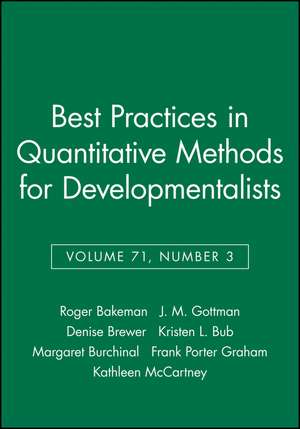Best Practices in Quantitative Methods for Developmentalists: Monographs of the Society for Research in Child Development
Autor K McCartneyen Limba Engleză Paperback – 7 mar 2006
hypotheses is widely recognized, yet even very experienced
quantitative researchers often lack the knowledge required
for good decision-making on methodology. The end result is
a disconnect between research and practice in methods. The
purpose of this monograph is to fill a gap in the literature by
offering a series of overviews on common data-analytic
issues of particular interest to researchers in child development.
Our hope is that this monograph will make already
developed methods accessible to developmentalists so they
can understand and use them in their research. We start at
the beginning with chapters on data management and
measurement, two neglected topics in methods training
despite the fact that every investigation should begin with
proper consideration of each. We follow with two important
topics for developmental research, missing data and growth
modeling. Missing data can plague developmental work
because participants sometimes miss one or more assessment
points. Growth modeling methods offer researchers a
true means to assess change over time as compared with
cruder methods like difference scores and residualized
change scores. Then comes a discussion of mediation and
moderation, two tools that can be used to elucidate developmental
processes. Because so much developmental
science is non-experimental, we include a chapter on selection
bias that compares five modeling strategies. Proper attention
to data management, measurement, missing data, growth
modeling (whenever possible), mediation and moderation,
and potential selection bias is guaranteed to result in greater
precision in inference-making. Even when researchers make
good decisions about methods, it is critical for them to use
good judgment about the practical importance of findings,
so we conclude with this important discussion. We view this
monograph as a first step to getting quantitative researchers
started and we believe this reference will help researchers
make better-informed decisions about methodology.
Din seria Monographs of the Society for Research in Child Development
-
 Preț: 419.38 lei
Preț: 419.38 lei -
 Preț: 434.13 lei
Preț: 434.13 lei -
 Preț: 414.12 lei
Preț: 414.12 lei -
 Preț: 418.99 lei
Preț: 418.99 lei -
 Preț: 398.39 lei
Preț: 398.39 lei -
 Preț: 424.76 lei
Preț: 424.76 lei -
 Preț: 398.21 lei
Preț: 398.21 lei -
 Preț: 367.34 lei
Preț: 367.34 lei -
 Preț: 397.82 lei
Preț: 397.82 lei -
 Preț: 433.97 lei
Preț: 433.97 lei -
 Preț: 447.14 lei
Preț: 447.14 lei -
 Preț: 449.86 lei
Preț: 449.86 lei -
 Preț: 479.76 lei
Preț: 479.76 lei -
 Preț: 487.26 lei
Preț: 487.26 lei -
 Preț: 481.67 lei
Preț: 481.67 lei -
 Preț: 481.28 lei
Preț: 481.28 lei -
 Preț: 489.55 lei
Preț: 489.55 lei -
 Preț: 531.41 lei
Preț: 531.41 lei -
 Preț: 481.12 lei
Preț: 481.12 lei -
 Preț: 479.17 lei
Preț: 479.17 lei -
 Preț: 459.92 lei
Preț: 459.92 lei -
 Preț: 482.04 lei
Preț: 482.04 lei - 28%
 Preț: 283.80 lei
Preț: 283.80 lei - 26%
 Preț: 277.56 lei
Preț: 277.56 lei - 29%
 Preț: 270.42 lei
Preț: 270.42 lei - 28%
 Preț: 250.80 lei
Preț: 250.80 lei - 29%
 Preț: 287.67 lei
Preț: 287.67 lei - 29%
 Preț: 247.41 lei
Preț: 247.41 lei - 32%
 Preț: 294.54 lei
Preț: 294.54 lei - 28%
 Preț: 251.59 lei
Preț: 251.59 lei - 26%
 Preț: 258.20 lei
Preț: 258.20 lei - 28%
 Preț: 260.80 lei
Preț: 260.80 lei - 27%
 Preț: 267.45 lei
Preț: 267.45 lei - 28%
 Preț: 262.68 lei
Preț: 262.68 lei - 29%
 Preț: 259.84 lei
Preț: 259.84 lei - 29%
 Preț: 206.62 lei
Preț: 206.62 lei
Preț: 233.51 lei
Preț vechi: 330.90 lei
-29% Nou
44.68€ • 46.78$ • 36.97£
Carte indisponibilă temporar
Specificații
ISBN-10: 1405169419
Pagini: 172
Dimensiuni: 155 x 228 x 9 mm
Greutate: 0.23 kg
Ediția:Volume 71, Number 3
Editura: Wiley
Seria Monographs of the Society for Research in Child Development
Locul publicării:Chichester, United Kingdom
